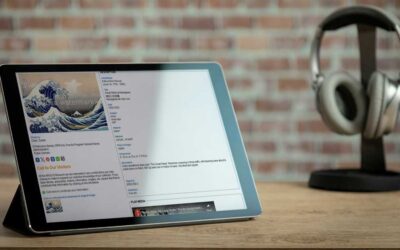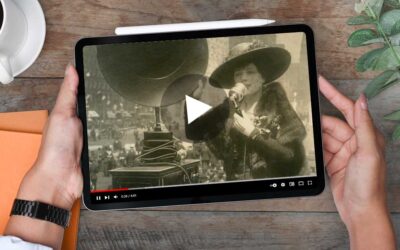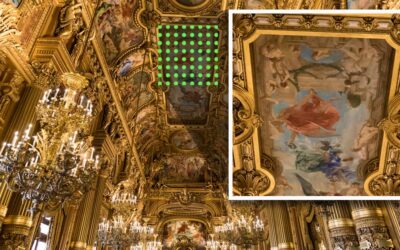Building a Blueprint for Future Digital Projects

Rachael Cristine Woody
If you’ve been following our digital projects series this month, chances are you came up with some really good digital project ideas, and you’ve gathered initial information to consider for each one. Don’t lose that work!
While you may only be able to engage in one digital project at a time, you’ll be planning your next one sooner than you think. Create a blueprint for where/how each digital project may fit in.
Note: Generating project ideas, creating project profiles, and creating a project blueprint can work for any type of project. This is an excellent exercise to go through to help you map out all of your projects.
Create Project Profiles
For each digital project idea that didn’t make the final cut, I recommend capturing the information below in a brief “project profile”. You can pull these out next time you need a digital project idea and you’ll be able to capitalize on the work you’ve done previously.
Information to capture in the project profile:
- Idea title
- A brief description on how the idea supports the museum mission and/or elements of the strategic plan
- How it fits within your position role and responsibilities
- How it may benefit your work and make it easier to meet stakeholder requests
- The anticipated ROI via the deliverables (products), outcomes, and benefits to the museum collections, the museum, and the museum community
- The estimated resources needed to execute the idea
- Why you’re excited about it
Create a Blueprint
As we discussed in The Most Common Museum Digital Project Types post, it may be that we can connect these project ideas, and expand them to include additional activities. Or, it could be that it makes more sense to prioritize one project before another because of how they can build off one another. Creating a blueprint to map these details out will help you see where there are opportunities.
To start, I recommend creating a timeline to map out how the projects may interconnect, expand into, or co-depend on one another:
- Create a timeline for the next 2, 5, and 10 years
- Write each of your idea titles on a post-it (or another transferable medium) with the estimated duration time
- Consider which projects can be done asynchronously and identify those that may depend on another to be performed first.
- Depending on your overall timeline you may find it advantageous to expand project scopes or divide them into phases.
- Play with idea placement on the timeline until you feel comfortable with how they are represented.
There’s no right or wrong way to create a blueprint, and you may create several iterations that can work for you. Additionally, museum priorities, job responsibilities, available resources and other factors will change year upon year, and updating your blueprint to reflect the current reality is a natural part of the process.
When to Use the Blueprint
To help you visualize future digital projects, this blueprint can be used in a number of ways. For example, Refer to this blueprint as you:
- Near completion of a project so that you can begin mentally and logistically preparing for the next project with minimal downtime.
- Prepare your grant roadmap for the year.
- Set out performance goals for the year that you can be evaluated on.
Conclusion
You now have the exercises, advice, and tools necessary to confidently create, prioritize, and plan for your future museum digital projects. These assets can be used to help you with grant applications, advocating for resources, engaging with the community, and partnering with peers in the field.
Additional Reading Available via Lucidea’s Think Clearly Blog:
5 Times LAMs Should Bring in a Consultant
Building a Comprehensive Museum Digital Program
The Difference Between Museum Digital Programs and Projects
How to Build Sustainability into Museum Digital Projects

Rachael Cristine Woody
If you’d like to learn more about this topic, register here for Rachael’s upcoming webinar, “How to Identify and Select Your Next Museum Digital Project” on March 30, 2022. Rachael Cristine Woody advises on museum strategies, digital museums, collections management, and grant writing for a wide variety of clients. In addition to several titles published by Lucidea Press, she is a regular contributor to the Think Clearly blog and an always popular presenter. And remember to check out Lucidea’s Argus solution for powerful and innovative museum collections management.
Never miss another post. Subscribe today!
Similar Posts
The CMS Digital Exhibit and Story Pathways
Digital exhibits provide powerful ways to engage audiences, but choosing the right story pathway is key. Explore how different exhibit structures—linear vs. multi-pathway—shape the visitor journey.
Captivating Story Delivery with a Multimedia Player
Explore how museums can enhance storytelling with multimedia players, using audio-visual materials and archival content to create engaging digital narratives.
How to Use Slideshows and Flipbooks to Offer Engaging Museum Story Visuals
Museums thrive on storytelling, and the right digital tools can make all the difference. Slideshows and flipbooks offer an engaging way to showcase collections, drawing visitors in with dynamic visuals and interactive elements.
Zooming Into Story Details:
How Museums Can Enhance Storytelling with Visual Tools
Visual tools such as zoom are crowd pleasers when presenting visual content online, allowing museums to create immersive and engaging digital experiences.




Leave a Comment
Comments are reviewed and must adhere to our comments policy.
0 Comments